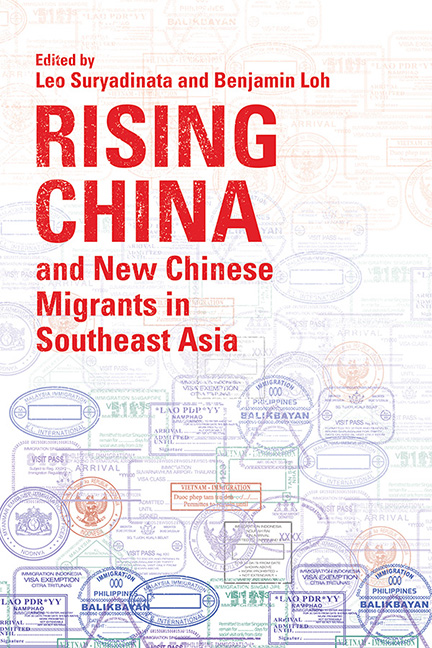Book contents
- Frontmatter
- Contents
- About the Contributors
- Introduction: Rising China and New Chinese Migrants in Southeast Asia
- Part I General Overviews on Rising China and Xin Yimin
- Part II China’s Soft Power, Xin Yimin and Local Communities
- Part III New Chinese Migrants and Local Communities
- Part IV New Chinese Migrants and Local Economies
- Index
16 - Entrepreneurial Excursions: Short-Hop Chinese Migration at the Peripheries of Myanmar
Published online by Cambridge University Press: 09 January 2024
- Frontmatter
- Contents
- About the Contributors
- Introduction: Rising China and New Chinese Migrants in Southeast Asia
- Part I General Overviews on Rising China and Xin Yimin
- Part II China’s Soft Power, Xin Yimin and Local Communities
- Part III New Chinese Migrants and Local Communities
- Part IV New Chinese Migrants and Local Economies
- Index
Summary
The boatman perches precariously on one end of a long bamboo raft, his hands clutching the long pole that guides the raft to the opposite bank. A traveller hops gingerly from the bank on to the other end of the raft, his right arm stretched out by his side to balance the weight of a heavy suitcase in the other. Stabilized, the boatman pushes off from the edge with his pole, artfully drifting across the river eddies and edging carefully to the other bank. It is dry season, the river is barely thirty metres wide, and the currents are gentle. The traveller strolls from one end of the raft to the other, hands the boatman some money, and hops off at the other end. This crossing of an international boundary has taken all of forty seconds.
This river is the international border between Yunnan Province, China and Shan State of Myanmar. And this illicit crossing has taken place in full view of the official border bridge just 200 metres upstream. The Chinese banks of the river are filled with gravel and larger rocks, dumped here as part of ongoing construction to build up its embankments. On the other side, sits Myanmar, but not really. It is a place called Wa Region, territorially part of Myanmar, but almost completely de facto autonomous, governed by the United Wa State Army (UWSA), an Ethnic Armed Organization (EAO) at odds with the Myanmar military (Tatmadaw) and Myanmar state. A ceasefire signed in 1989 when the UWSA was formed has never been broken, and an uneasy truce has held for thirty years. There are no Myanmar government representatives on the border; movement is regulated by the Chinese state and the UWSA.
Dozens of crossing points like this exist along the China–Myanmar border, perhaps somewhat surprising for two states which so jealously guard their national sovereignty. But such crossings are the sustenance of the borderland economy integral to China’s ‘going out’ policy: it circumvents the bureaucratic hassle of passports and documents; it provides commercial opportunities and livelihoods for border crossers, and eases pressures on the Chinese labour market.
- Type
- Chapter
- Information
- Rising China and New Chinese Migrants in Southeast Asia , pp. 322 - 338Publisher: ISEAS–Yusof Ishak InstitutePrint publication year: 2022



